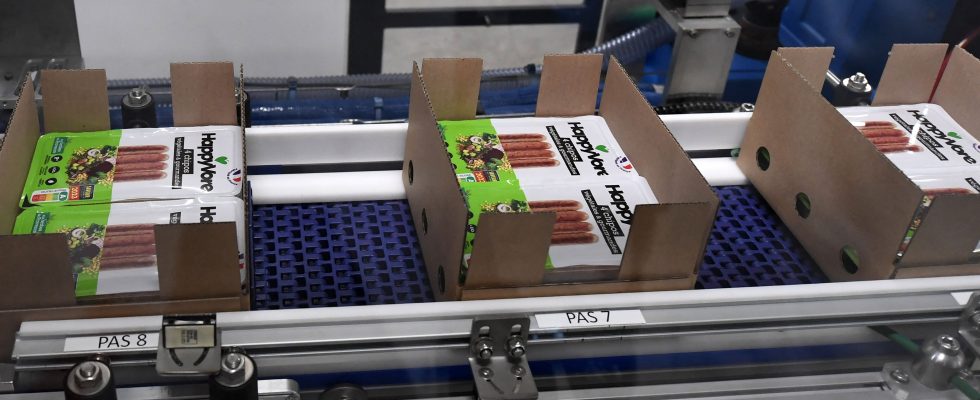The opening of a new factory is always a small event in a France which seeks to reindustrialize. So, when it combines food transition and local production bearing the tricolor seal, the government does not miss the opportunity to highlight it. This is how last May, the Minister of the Economy Bruno Le Maire headed to Chevilly, in Loiret, to cut the red ribbon and inaugurate the largest plant-based meat production site in the country.
The start-up Happyvore, launched in 2019 by two former McKinsey consultants, set up shop there to manufacture – in very large quantities – its nuggets and sausages based on vegetable proteins. A major turning point for this company which claims to be the leading player in this market in France and the second in Europe behind Herta – 40% owned by Nestlé. “This opening was decisive. All serious food manufacturers have their own factories,” explains Guillaume Dubois, one of the two co-founders. It should allow them to reach a capacity of 10,000 tonnes per year, compared to 1,500 to 3,000 tonnes previously.
Factory openings are increasing
Like Happyvore, several plant-based meat start-ups have embarked, in recent years, on the industrialization of their production by building their factories, in order to meet growing demand. “The plant-based meat market is quite atypical. It is doing quite well despite the inflationary context. A multitude of new players have developed and the weight of start-ups has almost doubled, while that of private label brands (MDD) has fallen”, explains Chloé Verneret, expert at the NielsenIQ institute. Be careful, however, that euphoria does not give way to dismay. In the United States, plant-based meat is struggling. Start-ups in the sector are failing one after the other, while the pioneer Beyond Meat is going through a major crisis.
The slowdown observed across the Atlantic does not, for the moment, affect the ambitions of young European companies. Starting with Planted. In 2020, this Swiss start-up built its first factory near Zurich. Barely two years later, it had already doubled its production of plant-based meat based on peas, sunflowers and oats, to reach one tonne per hour. A second opening is already in the pipeline. “We started by producing on a very small scale. Then we moved here with one production line, then we added a second one. And at each stage we were able to lower the prices,” says Christoph Jenny, the one of the co-founders.
Prices falling but not yet enough
The price remains, in fact, one of the main obstacles to purchasing, with most products available in supermarkets remaining more expensive than traditional meat. But the gap is narrowing. “If the price of alternatives does not fall, there will be no transition to plant-based,” warns Martin Habfast, co-founder of Umiami, which is preparing to produce its plant-based fillets imitating chicken in a factory, including The inauguration is planned for April 2024 in Alsace. “The main goal of this new site is to meet demand,” explains the entrepreneur. “When you go from a small unit in the Paris region to a larger one, this also has an impact in terms of cost and price. “
Controlling your own production is essential and strategic in the agri-food industry. “If I subcontract with someone else, I will not be free. Being a producer and having control over everything we develop saves considerable time,” says Thibaut Jouault, CEO of the start-up. Kokiriki which produces cold meat substitutes in Loire-Atlantique. And keeping control over the entire chain promotes innovation. Every day, the R&D teams of each company think about improving existing products and developing new ones.
“Our advantage is responsiveness”
However, the industrial transition did not happen overnight. “It’s a change of culture, assures Guillaume Dubois of Happyvore. We have exchanged a lot with the other actors because many of us are unable to change scale. We have one foot in the new world and another in the former, with start-ups, patents, technology on one side and mass distribution, catering and e-commerce on the other.”
This is where they can stand out from the big groups. “Our advantage is responsiveness: we are very close to the market and consumers. We observe directly whether a product works or not. But our form also brings its share of disadvantages: we have to learn things as we go along,” adds the entrepreneur. And to learn, we had to get support or seek out talent from large agri-food groups. The start-up La Vie, a specialist in bacon and vegetable lardons, has for example entered into a partnership with Sodebo. “Some of our employees go to their factory and we are in continuous communication in order to benefit from their expertise,” relates Nicolas Schweitzer, the co-founder. The young company has also poached “big names from Nestlé and Danone”. An asset for setting up the manufacturing site which should be built in 2025 in Vendée.
But unlike manufacturers, start-ups in the sector rely almost entirely on taste. “They have brought a new wind. You can push the product wherever you want. In the end, if it is not good, it will not work,” assures Martin Habfast of Umiami. To the point of lastingly shaking up consumer habits? As the holidays approached, Happyvore saw its sales jump by 20% online, while in mass distribution, they remained stable. Obviously, the French have not yet taken the plunge of a vegan Christmas.
.
